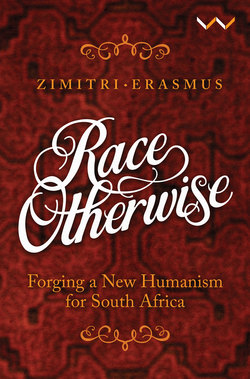Читать книгу Race Otherwise - Zimitri Erasmus - Страница 13
На сайте Литреса книга снята с продажи.
IN THE CREVICES OF RACIALISED LIFE
ОглавлениеThe countless contradictions of living inside apartheid showed up in the complex relationship between my family and Julia – as all of us, young and old, called her. She was a mature woman, classified Bantu, who helped my mother with household chores.6 She came from Coega in the Eastern Cape, and lived in KwaZakhele and later in Motherwell township in Port Elizabeth. She was born on Christmas Day and her given name was NoKrismisi. Her surname was Ndulula. Today I would address her as MaNdulula. Julia was her English name; English names had been long required by colonial governance, on the one hand as part of its power of subjection and on the other as a sign of its linguistic incompetence. Toward the end of my primary school days, among my mother’s suite of instructions regarding my conduct towards the woman whom I called by her first name, two are firmly etched in my memory, word-for-word:
My girl, Julia is not here to clean up after you. She’s here to help Mummy with work Mummy can’t do. So, you must still wash your dishes, make your bed, tidy your room, clean the bathroom and make your lunch.
And:
Two men in brown uniforms will come to the house together at any time. The white man will knock at the front door, the black man at the back door. They are the dompas [pass book] police coming to catch Julia and put her in the gomo because she doesn’t have papers yet. Remember, don’t open any of the doors. Julia will hide. You stand on a chair, open the passage window and tell the white man: ‘Meneer, my Ma sê ek moet vir niemand die deur oop maak ’ie.’ It doesn’t matter what he says, just repeat: ‘Meneer, my Ma se ek moet vir niemand die deur oop maak ’ie.’7
The dompas police came, choreographed as my mother had warned. Julia hid. I did as my mother told. The police went away.
Respect and compassion for an Other from an Other underlay these instructions. So did a savvy negotiation of apartheid authority. These practices informed many of my mother’s teachings. Fluent in isiXhosa herself, my mother taught me how to greet an ‘older African man’ respectfully: ‘molo tata ’mkulu’.8 She impressed upon me our responsibility as a family to provide soup and sandwiches for the road construction workers who spent all day outside the front wall of our home wielding pick-axes as they chorused in rhythm with their working bodies. I do not know the words they sang at the time. I do know that a common chorus among road construction workers was this: ‘Abelungu ’swine, swine, swine. Hulumeni ’nja, inja, inja. Hulumeni ’nja!’9 My mother neglected to teach me the respectful ‘Ma’ or ‘Mama’ due to the woman she employed as a domestic worker. She neglected to tell me what the road workers sang of and why.
At the same time, she instilled in me an awareness of aspects of the lives of Others expressed in the materiality of her and our lives: oppression, exclusion, racialisation, humiliation, hardship and poverty. I see in her practice a living tension between attempts to acknowledge and live alongside the colonial wound while at the same time living through this wound by inflicting it on an other Other. Alongside her complicity with some of apartheid’s norms, my mother’s daily interactions with Others were shaped by a yearning for humaning. This double performance of race – active recognition of its materiality in poor black worlds, on the one hand and, on the other, enacting its humiliations and silences – was the shape of South Africa’s apartheid ‘raceocracy’ (Hesse 2012): its paradigmatic colonial ascriptions and arrangements of race that seeped through the everyday and stained the very way in which we held and came to know at least parts of ourselves as Other.
